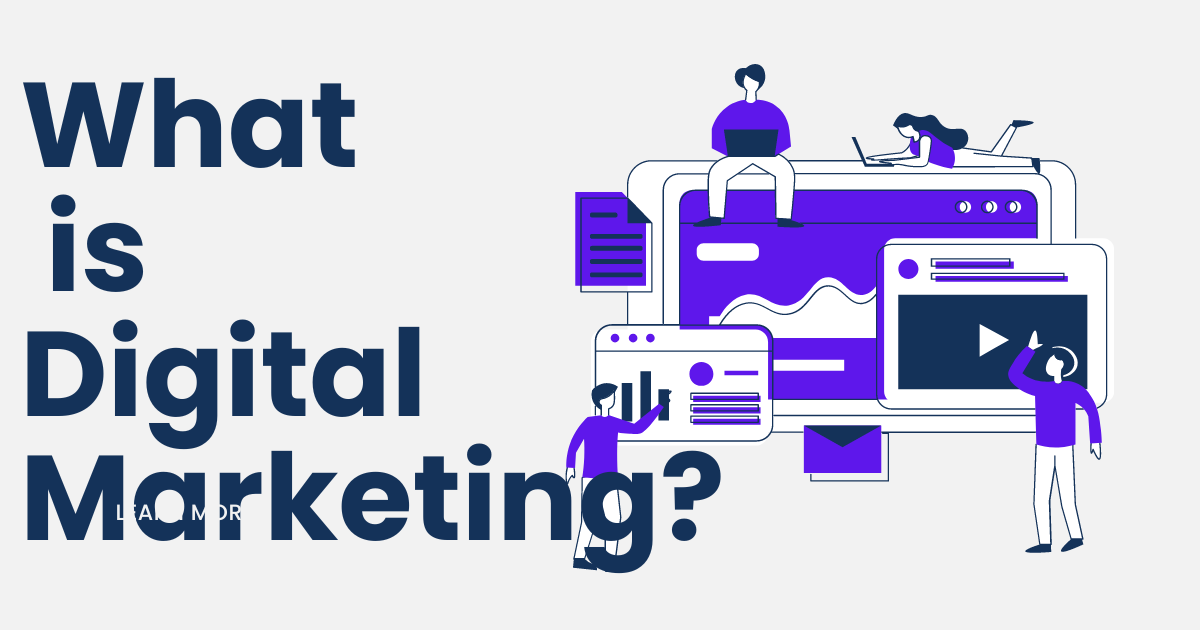Introduction
If a businessman starts a business today and wants the world to know about it, he has only two means of marketing: one is the old-school method of traditional marketing, and the other is doing it digitally.
“Digital marketing” is more than just a buzzword; it’s the lifeblood of modern business. But what is digital marketing, and why is it so crucial in today’s fast-paced digital landscape?
Join us as we delve into the fascinating world of digital marketing, uncovering its essence, strategies, and the remarkable impact it can have on your brand’s success.
Table of Contents
Definition of What is Digital Marketing.
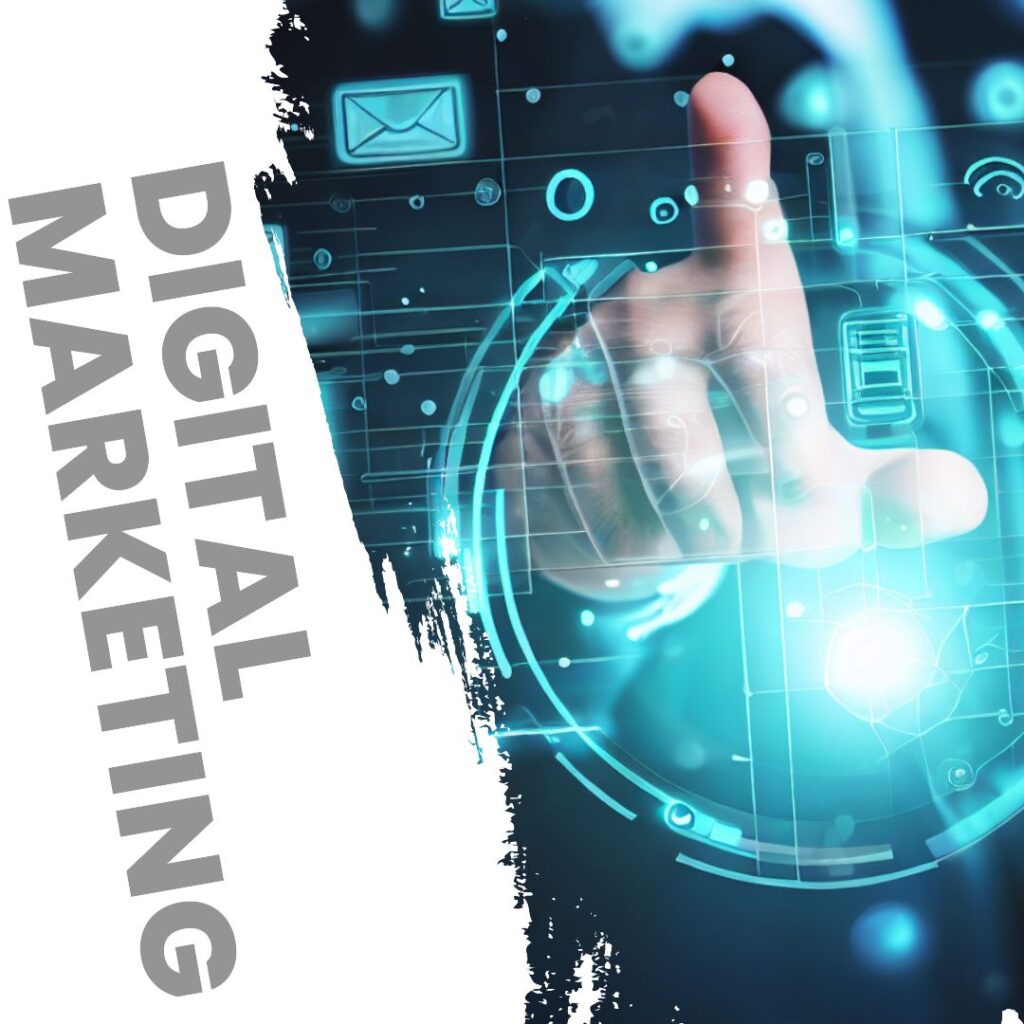
Neil Patel, a prominent figure in the world of digital marketing, defines it as ‘a broad term that encompasses all marketing channels and methods you can use to promote products or services on the Internet or electronic devices.’
This comprehensive approach highlights how businesses harness the power of the digital realm to promote their offerings and engage with their audience across various online platforms.”
Other renowned author Seth Godin quotes “Digital marketing can be defined as the art of reaching customers where they spend their time and attention: online.”
It’s a strategic blend of creativity and technology that allows businesses to connect with their audience in the digital realm.’ This succinctly captures the essence of how businesses leverage the digital landscape to engage and communicate with their target audience.
Understanding what is Digital Marketing?
Digital marketing is the art and science of harnessing the internet’s vast potential to engage and influence target audiences.
Unlike traditional marketing, which relies on physical mediums such as print advertisements or billboards, digital marketing operates exclusively in the digital realm.
This entails using various online channels and platforms to reach customers, build brand awareness, drive traffic, and ultimately foster business growth.
What’s Digital Marketing Essential Components?
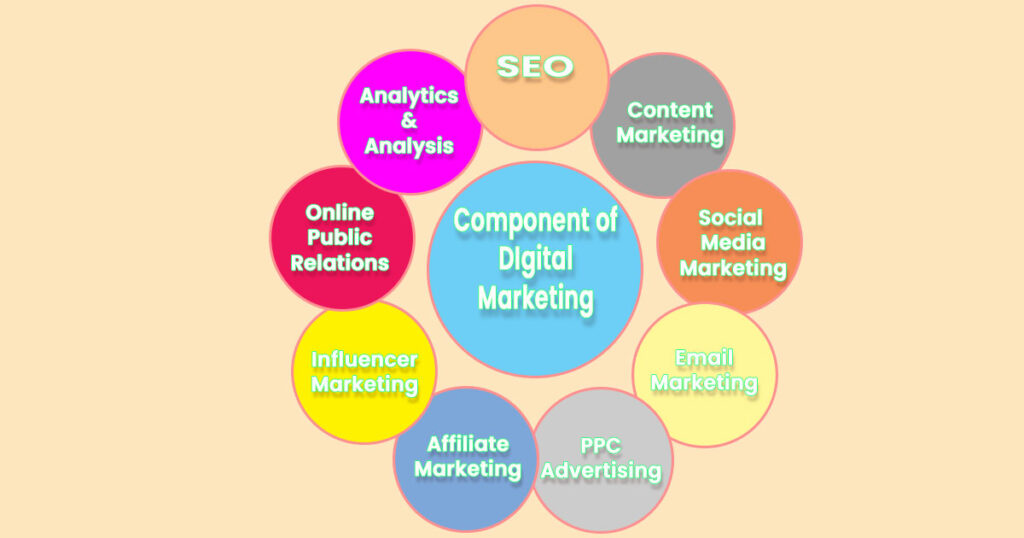
What is Search Engine Optimization (SEO) in Digital Marketing?
Search Engine Optimization (SEO) is the art and science of enhancing a website’s visibility on search engine results pages. It involves a combination of techniques, including keyword optimization, content improvement, and technical optimizations, all aimed at ensuring a website ranks higher in organic (non-paid) search results.
The primary goal of SEO is to drive more organic traffic to a website, increase its online presence, and ultimately, improve its chances of attracting and engaging with potential customers, making it an indispensable strategy for businesses striving to succeed in the digital era.
If you want to learn more about SEO, please check out our blog on SEO by simply clicking the link.
Content Marketing in digital marketing:
Content writing is the craft of creating written material for various purposes, from websites and blogs to marketing materials and articles. It’s not just about putting words on a page; it’s about crafting compelling, informative, and engaging content that resonates with the intended audience.
Effective content writing involves a deep understanding of the subject matter, a keen sense of the audience’s needs, and the ability to convey information in a clear and concise manner.
Whether its storytelling, persuasive copywriting, or informative blog posts, content writing plays a pivotal role in conveying messages, building brands, and connecting with readers in the digital age.
Social Media Marketing:
With the rapid and widespread growth, of social media platforms, businesses now have a powerful means to directly connect with their desired audience or more likely customer for their business.
Through the strategic use of social media, including sharing engaging content, actively interacting with followers, and running precisely targeted advertising campaigns, social media marketing not only amplifies brand visibility but also nurtures meaningful customer relationships.
Unlike traditional advertising methods, social media offers a dynamic and interactive channel where businesses can listen to feedback, address concerns, and provide real-time assistance, creating a more personal and engaging experience for their audience.
As a result, social media has become an indispensable tool for modern businesses seeking to build trust, loyalty, and a strong online presence in the digital age.
Celebrities often use Instagram, Twitter, TikTok, and Facebook, some of the world’s most famous social media platforms, to connect with their fans and share behind-the-scenes glimpses of their lives. This is true power and network of social media platform.
Email Marketing:
Celebrated email marketing brands like Mailchimp have revolutionized the landscape, offering businesses powerful tools to streamline their email marketing campaigns.
Email, as orchestrated by these platforms, continues to be a robust and indispensable tool for businesses when it comes to cultivating and sustaining customer relationships.
Email serves as a versatile channel that enables companies to effectively distribute promotional content, disseminate important updates, and craft personalized experiences tailored to individual recipients.
Through the art of email marketing, businesses can strategically segment their audience, ensuring that the right message reaches the right person at the right time.
By providing value-driven content, companies can not only capture the attention of their audience but also foster a sense of loyalty and trust.
In doing so, email marketing acts as a catalyst for driving customer engagement, deepening brand affinity.
Pay-Per-Click (PPC) Advertising:
PPC advertising is method by which ads running firm places paid ads on search engines and online platforms, charging advertisers only when users click on their ads.
This precision targeting ensures that ads reach the precise users, actively seeking relevant products or services online, making PPC cost-effective as advertiser has a direct advantage of reaching consumer.
PPC advertising offers a measurable Return on Investment (ROI) by tracking user interactions and providing data-driven insights. Advertisers can optimize campaigns, refine messaging, and allocate budgets effectively, thanks to detailed performance metrics.
This data-driven approach makes PPC a powerful tool for driving traffic, conversions, and measurable results which are both helpful to advertisers as well as customers.
Affiliate Marketing:
Imagine you really like a particular product, let’s say it’s a cool gadget. You tell your friend Rahul about it, and he decides to buy it because he trusts your recommendation.
Now, here’s the twist: The company that sells this gadget notices that Rahul bought it because of your recommendation. So, they decide to thank you by giving you a small part of the money they made from selling the gadget to you friend. This is affiliate marketing.
Businesses often collaborate with affiliates to enhance the promotion of their products or services. Affiliates play a pivotal role by leveraging various marketing strategies to create awareness and generate interest among their own audience.
In exchange for their promotional efforts, affiliates receive commissions or a percentage of the sales revenue for each successful sale directly attributed to their marketing activities.
Notable affiliate marketing companies, such as Amazon Associates, ShareASale, and CJ Affiliate (formerly Commission Junction), facilitate these partnerships between businesses and affiliates, providing the infrastructure and tools needed to track, manage, and optimize affiliate marketing programs.
Influencer Marketing:
People tend to be drawn to celebrities; they follow and want to know more about them. Companies seize this opportunity by offering financial incentives to famous individuals to promote their products. These influencers, often famous people, have a substantial number of followers, some of whom are dedicated enthusiasts. Their recommendations hold weight because followers see them as trusted sources.
Such types of marketing by companies where in they use influencer to promote or market the goods are known as Influencer marketing.
Here is example where you could understand the influencer marketing clearly,imagine a fashion brand collaborates with a popular Instagramer, who is a fashion influencer.
The influencer showcases the specific brand’s clothing, leveraging their style authority. Their followers, who admire their fashion sense, are more likely to trust the brand’s products based on the influencer’s endorsement and huge trust level for the influencer.
Online Public Relations (PR):
Online PR is all about managing a brand’s digital reputation. This involves handling customer interactions, engaging with the media, and maintaining a positive image.
For instance, if a customer shares a complaint on social media, a quick and empathetic response from the brand can turn a potential problem into an opportunity to showcase excellent customer service.
Similarly, securing positive reviews or mentions from influential online sources can boost a brand’s credibility and reach within its target audience.
In essence, online PR is about skillfully navigating the digital landscape to build and protect a brand’s image in the eyes of the online public.
Analytics and Data Analysis:
Analytics: Analytics involves the process of collecting, processing, and analyzing data to uncover meaningful patterns, trends, and insights for informed decision-making.
Data Analysis: Data analysis is the specific step within analytics where data is examined and interpreted to identify patterns, draw conclusions, and make informed interpretations.
What are Benefits of Digital Marketing?
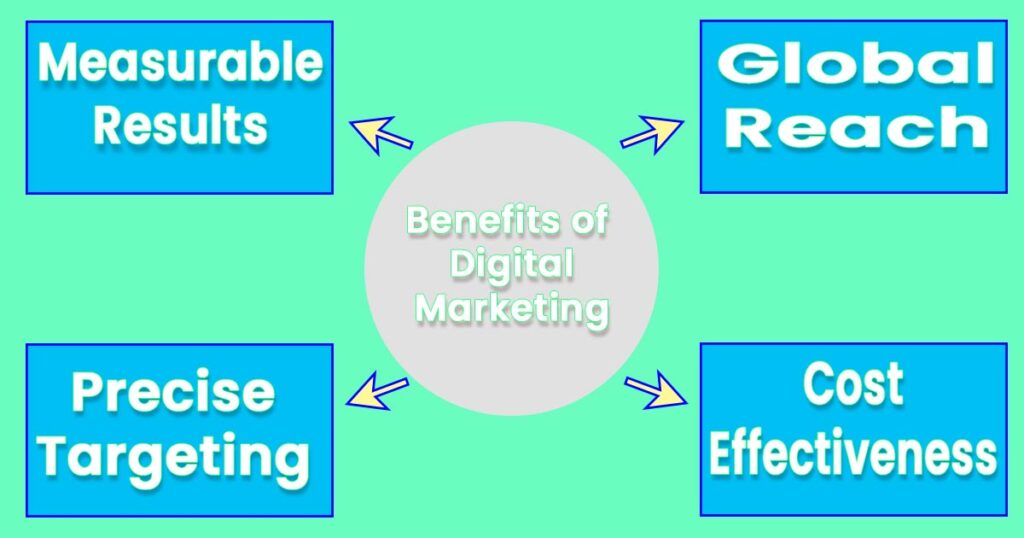
Global Reach:
The internet’s worldwide reach allows businesses to connect with audiences and their customers across geographical boundaries. This opens up new markets and opportunities for growth with seamless boundaries.
Cost-Effectiveness:
Digital marketing often offers a higher ROI compared to traditional marketing methods. Small and large businesses alike can allocate their budgets more efficiently.
Precise Targeting:
Businesses can target audiences based on their interests, demographics, and behaviors through digital marketing, significantly improving the likelihood of reaching the right audience at precisely the right moment.
Measurable Results:
Digital marketing lacks the real-time data and analytics that businesses need to monitor campaign performance and make immediate adjustments, which is a feature often lacked by traditional marketing methods.
What is Digital Marketing Strategy and how to create it?
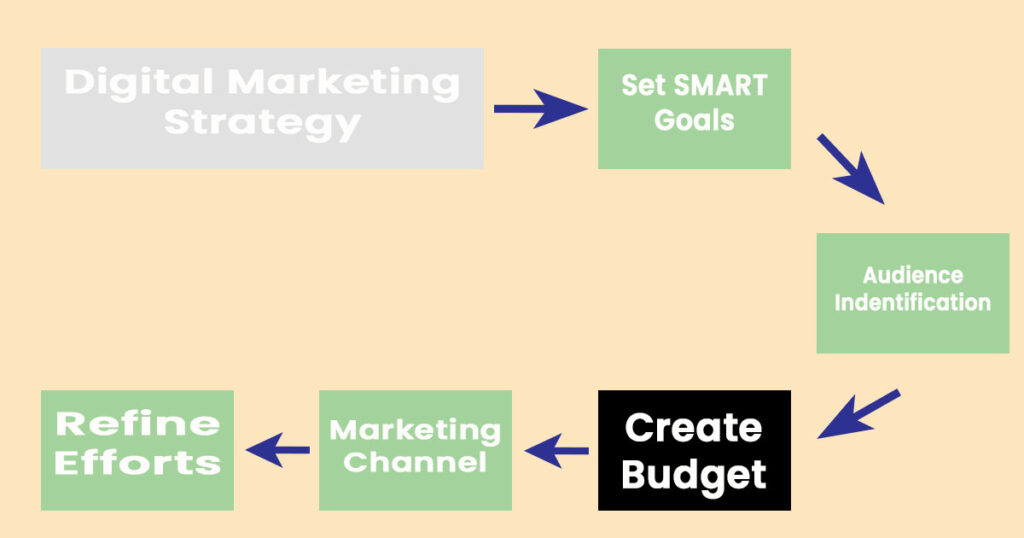
Set SMART Goals:
Start by setting SMART goals for your digital marketing efforts. These goals should be Specific, Measurable, Achievable, Relevant, and Time-bound. Ensure that these objectives are in harmony with your broader business goals.
For instance, if you aim to increase online sales, set a specific target for the percentage growth in sales over a specific period.
Identify Your Audience:
Understanding your target audience is crucial. Create detailed customer personas that include demographics, interests, and pain points.
Knowing your audience helps tailor you’re marketing messages and campaigns to reach and convince the viewer with you point of view.
Create a Budget:
Budget is uttermost important aspect of while growing the companies from point zero. Determine your digital marketing budget, considering various expenses such as advertising costs, software tools, and personnel expenses.
A well-planned budget ensures you allocate resources efficiently and can experiment with different strategies that some is needed in order to gain upper hand.
Select Your Digital Marketing Channels:
Choose the digital marketing channels that target your audience in order to achieve your goals. Options include social media, email marketing, content marketing, SEO, PPC advertising, and more. Each channel has unique strengths and appeals to different audience segments.
Refine Your Marketing Efforts:
Regularly monitor and analyze your digital marketing performance. Key performance indicators (KPIs) are best way to assess the effectiveness of your campaigns. Based on data insights, make necessary adjustments to optimize your strategies.
In Conclusion
Digital marketing is the keystone for modern business promotion. By understanding its foundational components and advantages, businesses can navigate the complex online landscape to achieve their objectives. Embracing digital marketing empowers brands to engage with audiences authentically, optimize campaigns using data-driven insights, and ultimately thrive in the digital age.
